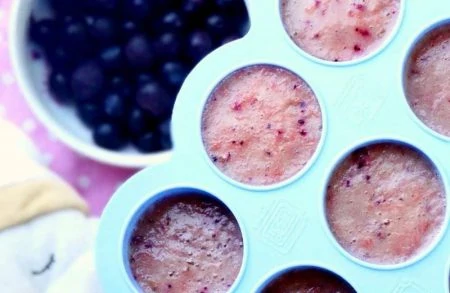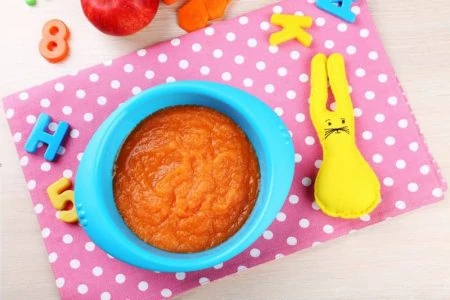But when exactly should you put green veggies on the menu? How do you prepare them safely? We have the answers on buying, storing, and serving this leafy green to your growing baby.
Key Takeaways
- Spinach can typically be introduced around 6 months of age, once your baby shows signs of readiness for solids.
- Cooking spinach (steaming or boiling) helps reduce naturally occurring nitrates and oxalates, making it easier for babies to digest.
- This leafy green is a nutrient-dense source of iron, calcium, and vitamins A, C, and K.
- For younger babies, stick to smooth purees; older babies doing baby-led weaning can try cooked, finely chopped clumps or omelet strips.
Can Babies Eat Spinach?
Yes, spinach is an excellent food choice for babies. It is arguably one of the most nutrient-dense vegetables you can offer. Dark, leafy greens like spinach, kale, and chard help support your baby’s skin, hair, and bone density.
Beyond the basics, spinach provides essential Omega-3 fatty acids, iron, and a host of vitamins that support long-term development. However, because leafy greens can be fibrous and contain naturally occurring compounds like nitrates, preparation is key.
When Can Babies Eat Spinach?
In the past, parents were often told to wait until 8 to 10 months to introduce spinach. However, current guidelines from the American Academy of Pediatrics suggest that most babies can start solids, including spinach, around 6 months of age.
Your baby is likely ready for solids when they show these physical signs:
- Head control: They can hold their head up high and steady without support.
- Sitting skills: They can sit upright with minimal assistance.
- Lost tongue-thrust: They don’t automatically push food out of their mouth (the extrusion reflex).
- Curiosity: They eye your dinner plate or mimic your chewing motions.
Always consult your pediatrician before starting solids. If your doctor gives the green light, you can introduce spinach as one of their first veggie experiences.
Nitrates and Oxalates: What You Need To Know
You might see warnings online about nitrates or oxalates in spinach. Here is the lowdown on why preparation matters.
Nitrates
Spinach contains nitrates from the soil. In very rare cases, excessive nitrate intake in young infants can affect blood oxygen levels. However, this is extremely uncommon in babies over 6 months old. To play it safe, experts recommend cooking the spinach (boiling or steaming), which significantly reduces nitrate levels (1).
Oxalates
Spinach is also high in oxalic acid (oxalates), which can sometimes inhibit calcium absorption or contribute to kidney stones if eaten in massive quantities. Just like with nitrates, cooking the spinach breaks down some of the oxalic acid and makes the iron and calcium easier for your baby’s body to absorb.
Why Spinach Is a Superfood for Babies
This leafy green punches way above its weight class when it comes to nutrition. Here is why you should add it to the menu:
- Vitamin Powerhouse: Spinach is loaded with Vitamin A, which promotes healthy skin and vision. It also packs Vitamin C (for immunity), Vitamin K (for blood clotting), and folate (2).
- Mineral Rich: It is a solid source of iron, zinc, and magnesium. Iron is critical for brain development, while zinc helps heal tissues and support the immune system.
- Bone Health: The combination of calcium, magnesium, and Vitamin K contributes to strong, healthy bone development during these rapid growth spurts.
- Antioxidants: That dark green color comes from chlorophyll and carotenoids (like lutein). These act as antioxidants, fighting inflammation and protecting eye health (3).
How To Serve Spinach Safely
Texture is the biggest challenge with leafy greens. Raw spinach leaves are a major choking hazard because they are difficult for gums and new teeth to break down. They can get stuck to the roof of the mouth or throat.
Here is how to serve it based on your baby’s stage:
- 6 to 9 Months (Purees): Steam or boil the spinach thoroughly, then blend it into a smooth puree. You can mix it with apple, pear, or sweet potato to mask the slightly bitter taste.
- 9 to 12 Months (Texture): As your baby gets used to chewing, you can offer finely chopped, cooked spinach.
- Baby-Led Weaning (BLW): If you are skipping purees, do not serve loose leaves. Instead, mix chopped, cooked spinach into an egg omelet strip, a meatball, or a potato pancake that your baby can easily grasp and gnaw on.
Easy Baby Spinach Puree Recipe
Making homemade baby food is easier than you think. Follow these simple steps for a nutrient-packed meal.
- Wash: Rinse the fresh spinach leaves thoroughly in cool water to remove grit.
- Cook: Place the spinach in a steamer basket or boiling water. Cook until the leaves are completely wilted and soft (usually 2 to 3 minutes).
- Shock (Optional): Rinse with cold water to stop the cooking process and keep the bright green color.
- Blend: Toss the spinach into a blender or food processor. Puree until smooth.
- Adjust: Add a teaspoon of water, breast milk, or formula if the mixture is too thick. Do not add salt or sugar.
FAQs
Eat Your Greens
Introducing new flavors to your baby is an adventure. While spinach might have a strong taste compared to sweet fruits, many babies grow to love it.
Think of this as a journey you are taking together. Start with small spoonfuls, mix it with familiar favorites, and do not be discouraged if they make a funny face the first time. Keep the mood light, and remember that every bite is a step toward healthy eating habits.











